As a seasoned performance artist, Nina has spent over 20 years blending her talent in film, stage, and spoken word into a career that knows no bounds. With an eclectic mix of grit, curiosity, and sheer optimism, Nina’s body of work was built from the ground up, layer by layer.
An Air Force veteran, Nina was stationed at Langley AFB in Hampton, Virginia, close to art scenes throughout the northeast, where she cultivated her talents as a performer and found her passion as a host.
As a cultural mentor and sought-after speaker, Nina is dedicated to helping audiences find their truth through powerful self-discovery and mindfulness. In 2012, she published her memoir, Dramas of a Bald Head Queen, sharing her experiences as a Black girl growing up in the heartland of America.
A Dream Realized, a Life Reimagined
MaCherie Dunbar: How would you describe your connection to the LGBTQIA+ community?
Nina Ligon: I’m still defining the language I want to use. Questioning is more accurate to where I am, but I would consider myself queer, and I’m in a relationship with a lovely woman.
MD: I think queer is a more broad and inclusive term, so you’ll note I use that word instead of the alphabet soup that is LGBTQIA+ and forcing you to choose. I’m glad that fits in with where you are.
NL: Yes, thank you.
MD: I see you served until 2005. When did you come to Washington, DC?
NL: I officially moved here three and a half years ago, but I’d been up and down, and in and through DC for the past twenty-something years since my time at Langley Air Force Base -- which is only about three and a half hours away.
DC is quite literally the place I wanted to live in since I was 13 years old. I’m originally from Wichita, Kansas, and I took a trip out here that year, and I was like, “WOW. The diversity, the Blackness, the diversity of Blackness. It amazed me. Between that and the trees, it’s a lot different from Kansas.
MD: You started living out that 13-year-old dream a long time ago.
NL: In real life, and it’s so crazy now that I live here. In the Air Force, the “kinder and gentler” force, we had choices. We had our top 5 bases that we wanted to go to, and I had the opportunity to say Andrews or Bolling, bases that were right here in DC or just outside of it, and I punked out. I think my small-town upbringing had me a little afraid of getting to the city, and I knew myself in my early twenties…
MD: Diving headfirst into Chocolate City might not have been the best thing for you.
NL: Girl.
MD: Has the diversity of Blackness in DC been supportive of your journey into queerness?
NL: Yes, it has. There’ve been a few brothers and sisters who were a bit surprised at me poppin’ out with this new relationship, but beyond that, I can’t say that I’ve gotten many haters. There was one, but we dealt with that.
Even where I work full-time is a place where I’ve been able to ask the questions of myself and have the freedom and safety and the community to explore who I am.
I am a divorcee, and this season of my life has placed me in a position to have the freedom and the boldness and the confidence to question every area of my life as I continue to rebuild, all the way over to my spirituality. It’s so funny the way people look at queerness as being just about our sexuality. I really see it as looking at my life and living life in a way that is against the grain in general.
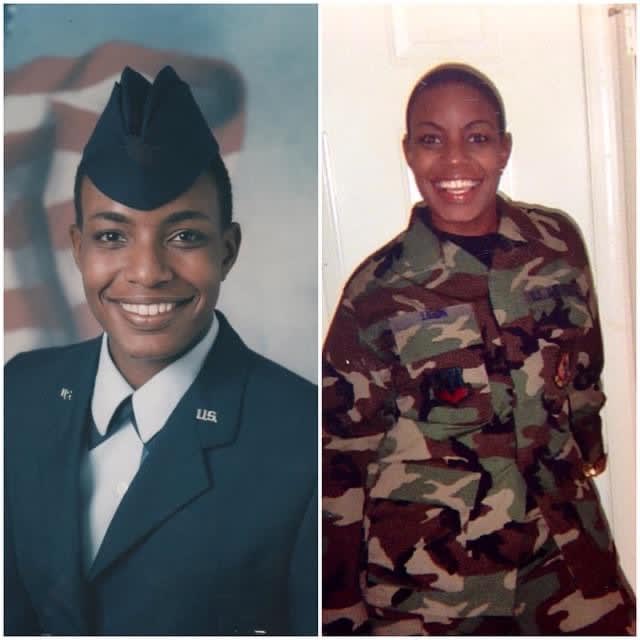
Nina in uniform
MD: I love your point about queerness being more than just our sexuality. I think if it were just that, coming into this [queer] experience would be much easier. How many people truly live in the absolutes of straight OR gay? There’s so much in between.
Too Black, Too Queer, Too Different: Hair, Race, and Identity in Uniform
As you mentioned, going through a divorce, and in a place of questioning, were you living a more heteronormative lifestyle during military service?
NL: Yes. Looking back, there were times I wanted to explore my sexuality and my beliefs and ideas, but I was still not quite comfortable asking the questions of myself at that time.
After I got out of the military and kicked it real hard in my twenties, I came back to God and back to my Christian upbringing. I met a good, Godly man and said let me slow down and be a good, Godly woman. So, I married a young man, probably two years after I separated from the Air Force. He’s a great guy, but even beyond my desire to explore other avenues, we just were not for one another.
MD: I think many of us can get that. You were also serving during Don’t Ask, Don’t Tell. How did you experience queerness in others? Did you have an awareness of what they were going through?
NL: Oh, yeah. There were some who were a little more comfortable being themselves, even while in uniform. Some of my baby brothers were flaming, honey, as flamboyant as they could be.
You know, it’s interesting…you took my brain all the way back to basic training. When I went through MEPS, I had locs. I was thinking, “I’m going to cut my hair off because I don’t want them to try and make me cut my hair off. I figured the locs would just be too Black, too much.
I cut my hair, and I remember being told that my hair was gender inappropriate because it was short like it is now. [Nina wears a low and even fade]. The irony is that the chief of my flight was this clearly lesbian White woman. But she had her long ponytail, so ok, girl.
But honey, she was more masculine than most of the male training instructors that I encountered. It’s interesting that while some people were trying to suppress who they were to fit in with the uniform, they would project onto people like me, who, at the time, weren’t necessarily living out their queer existence, or even thinking about it.
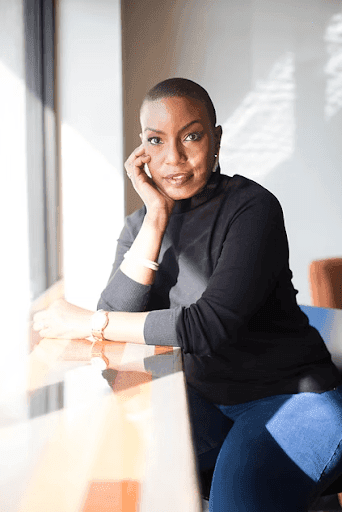
Photo by fringecreativeva co.
MD: It’s so interpretive, and it comes down to the command staff of your unit. I’m a former Air Force member as well, and my hair was also that short. I learned to quote AFI 36-2903, which (at the time) said hair could be short, up to 3 inches, for women.
NL: Come on Regs. I love it.
MD: What’s interesting is that you were concerned about being too Black, with your hair, and you ended up being targeted for queer adjacency. The irony is not lost.
Knowing the standards were not the same across the board, how do you feel like that influenced your military service and experience?
NL: I think that is what made my military service so short. I really struggled with that double consciousness, with the idea of being Black in this service. There were people in my squadron who were clearly racist, and especially on the flightline. This is where your good ol’ boys really reside.
Dealing with that, paired with being told that I can’t have that hair color because it isn’t natural, or I can’t wear that style because it looks unkept…All those things, in addition to my ideas around empire, and I could really dive deep into colonialism…I really struggled with that. I was conflicted about what it means and what it stands for. Where our federal government currently is absolutely supports those feelings.
MD: I would imagine that whatever curiosities you had, the way that you were being treated just for being Black, and probably for being a woman in a flightline environment, would’ve certainly prevented you from adding another [diversity] qualifier, opening the door for more mistreatment.
NL: Absolutely. And I did see that happen. This conversation is bringing back a lot of memories from that time. I remember there being some queer or lesbian sisters on the base who would get harassed because the brothers were mad they weren’t trying to holler at them. There was often a lot of harassment, almost to the point of violence. So, yeah, any curiosity I had… (shrugs shoulders) …don’t even worry about it.
Living the Freedom My Mother Was Denied: On Liberation, Love, and Baby’s First Pride
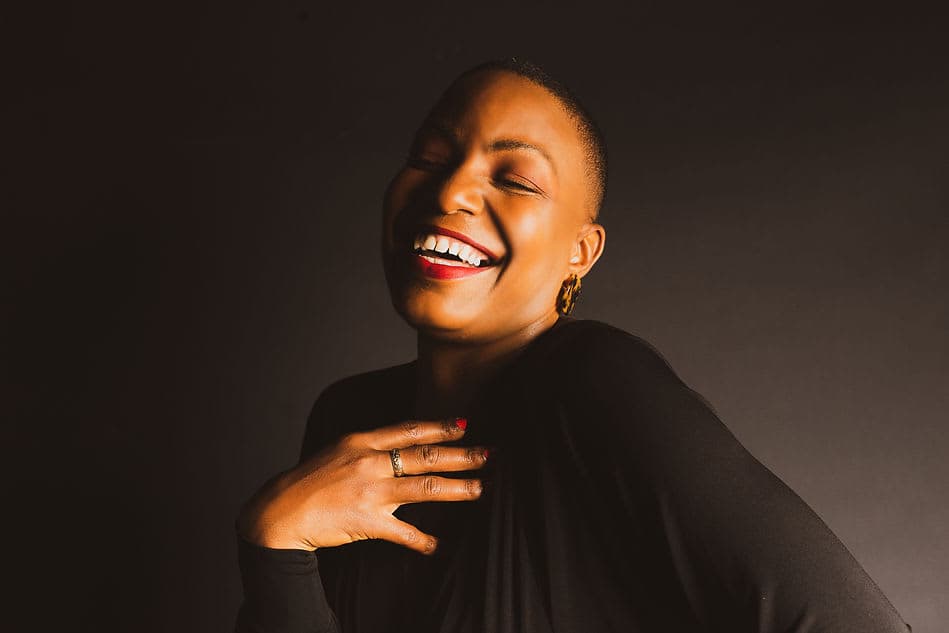
Photo by fringecreativeva co.
MD: Looking back at that, and now twenty years later in this beautiful truth you’re living in…as an overall reflective, how does that feel for you?
NL: It’s liberating. I was raised from 10 years old to 18 with my mother (who was a lesbian) and her partner. I look at my life now and think about the freedom that I have that my mother never got the opportunity to experience.
Moving here to DC, I had the opportunity to participate in my first Pride parade just last year. And I was like, “Oh shoot, Baby’s first pride!” And I remember having a moment where I just wept, because I wish my momma were here so we could do this together. I wish she were here to meet my partner. I wish…that life could be different in that way.
But the liberation that I’ve found since being here in DC is second to none. It’s small, but it gives big city vibes without being as big as New York or even Philly. I’m able to do the city things and then make my way over to my nice little corner in Southeast and mind my Black business.
Building a Yellow Brick Road: Finding Community in DC
MD: I know that’s right. How about your community here in DC? I know there’s a solid Black queer community, but have you found much community where it intersects with the military/veteran component?
NL: Yes, actually. What’s interesting is that a lot of my friends from the military either retired from Andrews or moved and settled in this area, and quite a few of them are queer or queer affirming. They’ve been here to help build community and help point me in the direction that I needed to go as it pertains to my Blackness, my queerness, and being a veteran.
MD: A lot of people communicate having a harder time finding community at the intersection of Black queer and veteran. For people who are struggling, where would you say they look?
NL: Holla at your girl. I like to consider myself a conduit. I’ll point you in the right direction. I can say that they’re not at bars.
I made lists of people and businesses I wanted to work at and people I needed to connect with. What services could I offer? It was my own yellow brick road. I found my way and met the people I needed along the way. It was my own yellow brick road (winks).
MD: Touché. I think tapping into our own network is something a lot of people forget. You never know who you know. Or who they know.
NL: When people are in times of need, we often feel like we need to put our heads down and figure it out, and that’s not how we were created to live. We’re communal beings, and so being able to ask who has the job, who has the house, I need friends…you have to tap into that vulnerability.
MD: To someone who may not holla at you, what do you think DC itself can do better to support our unique community?
NL: Being newer to the queer community, I’m thinking about how white male-focused a lot of things are, even the nightlife. I think that government organizations need people. They need voices and people to do the work to provide the space. That way, there’s not some white man saying, “This is what the Black female gay community needs.” No, we’ll tell you what we need.
No Regrets, Just Lessons
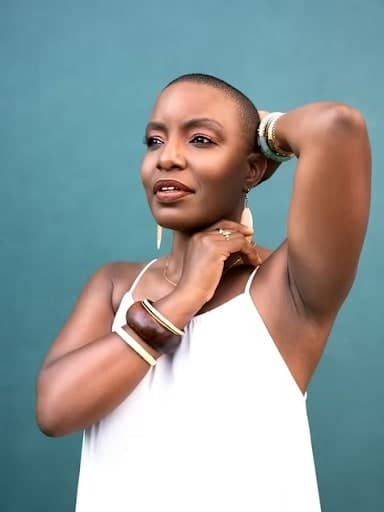
Photo by fringecreativeva co.
MD: Thinking larger with relation to federal policy and all these changes and threats that are happening now, does that make you feel concern for those who are still serving?
NL: I have a nephew who is in the Navy, God bless, and he’s good and gay. He seems fine, for now, but I am definitely concerned. (a pause).
MD: It’s tough. With same sex marriage being challenged at the Supreme Court, it’s going to affect active-duty members. It’s going to affect veterans. It’s going to affect your nephew, who is queer and “out” in the military, especially as a young Black man.
What would you want him to do?
NL: I want him to go to Howard, where he had a full ride! Baby, he was class president and everything in his high school graduating year. I’m so proud. But he chose the Naval Academy and is doing well.
MD: Come on, nephew! That’s still a highly prestigious education and, at the end of the day, you’re getting paid for the crap you’re dealt.
NL: That part. He’s an amazing young man, he really is. And I just pray that he’s safe in all his Black queer glory.
MD: I hope for the same.
What would you say your biggest challenge was during your transition?
NL: By my last year of service, just a few years after 9/11 happened, everything had already started changing in ways people were being treated. Even our Muslim brothers and sisters on bases were being treated wrong. I was so over it all that I did not leave prepared to take full advantage of everything that I learned during the process. Threw up two fingers, and I was out.
MD: Sounds like that would be your advice to those who are transitioning: be prepared.
NL: Yes, and this would go for any career you find yourself in. Take advantage of where you are and the resources that you have while you have them. Use them as a stepping stone to get to the next place. Any transition is going to be difficult, but we make it more difficult when we throw two shots into the air and ride out without a firm plan.
I’d also say to find a support system, before you go, of people who can see beyond military service. I think a lot of times, people who are still in, or left before they should have or wanted to, they project onto us in ways that can keep us discouraged from moving full steam ahead with the plans we’ve made.
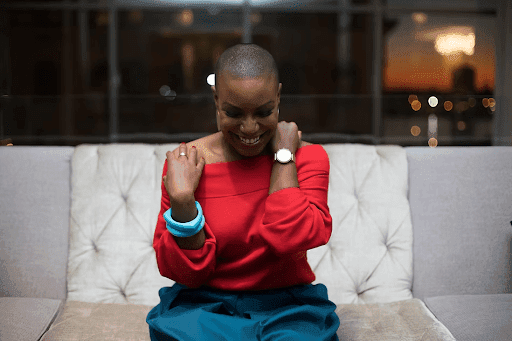
Photo by fringecreativeva co.
MD: That’s very insightful and accurate from my own experience.
Would you do it all over again if you could?
NL: It’s a yes and no. Where am I morally? Nah. But I get why people continue to join, and I can’t hate that because it was beneficial to me as well.
As my father told me when I was leaving for the Air Force, “Make the most out of every situation you find yourself in and every opportunity you get.” And so, the people I’ve met, and going to Kuwait and stopping in places like Germany and Ireland, helped me experience the world in greater measure, and at a faster pace, than I would have had I just stayed in Wichita, Kansas.
MD: Maybe a better question would be, do you regret it?
NL. I don’t regret it. I don’t regret it, but I wouldn’t do it again. I tell people that May 31st, 2000, I made the best decision of my life, and May 31, 2005, I made the best decision of my life.
This interview was conducted by MaCherie Dunbar, special issue co-editor and guest contributor, an award-winning advocate, and Black queer veteran residing in Washington, D.C. Make sure to read her personal story in this issue.













